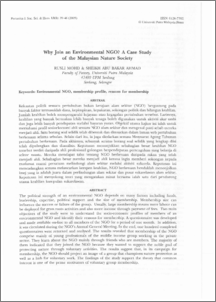Citation
Mohd, Rusli and Ahmad, Sheikh Abu Bakar
(2005)
Why join an environmental NGO? A case study of the Malaysian Nature Society.
Pertanika Journal of Social Sciences & Humanities, 13 (1).
pp. 39-46.
ISSN 0128-7702; ESSN: 2231-8534
Abstract
The political strength of an environmental NGO depends on many factors including funds, leadership, expertise, political support and the size of membership. Membership size can influence the success or failure of the group. Usually, large membership means more labour can be deployed for grass roots activities and also more income through payment of fees. Two main objectives of the study were to understand the socio-economic profiles of members of an
environmental NGO and identify their reasons for membership. A questionnaire was developed and made available on-line to all members of the NGO for a period of one month. In addition, it was circulated during the NGO's Annual General Meeting. In the end, one hundred completed
questionnaires were returned and analysed. The results revealed that membership of the NGO comprise mainly of young professionals of the middle income group working in the private sector. They learn about the NGO mainly through friends who are members. The majority of them indicated that they joined the NGO because they wanted to support the noble goal of protecting nature through voluntary activities. The results suggest that, in its campaign for
membership, the NGO should project an image of a group that champions nature protection as well as a hub for voluntary work. The findings of the study support the theory that common interest is one of the prime motivators of voluntary group membership.
Download File
![[img]](http://psasir.upm.edu.my/style/images/fileicons/application_pdf.png)  Preview |
|
PDF
Why_Join_an_Environmental_NGO_A_Case_Study.pdf
Download (2MB)
|
|
Additional Metadata
Actions (login required)
 |
View Item |

